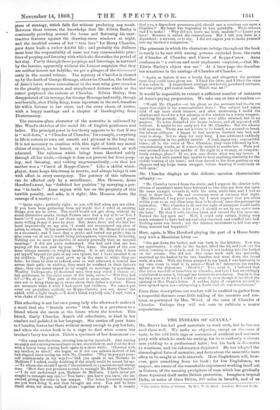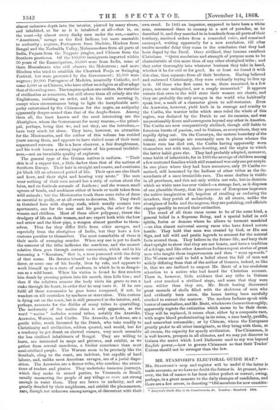THE INDIANS OF GUIANA.*
MR. BnErr has had good materials to work with, but lie has not used them well. We make no objection, except on the score of taste, to the odd little tags or sentences of artificial and unctuous piety with which lie studs his writing, for he is evidently a sincere man yielding to a professional habit ; but his book is discursive to weariness, and his information disjointed. He has adopted the chronological form of narrative, and facts about the same tribe have often to be sought at wide intervals. Most Englishmen will, how- ever, gain something from his book ; for few Englishmen, we suspect, are aware of the remarkable experiment working itself out in Guiana, of the amazing precipitate of man which has gradually there deposited itself under British protection. Imagine a tropical Delta, or series of three Deltas, 200 miles in breadth, and of an
• The Indian Trite, of Guiana. By Bey. W. II. Brett. London : Bell and Daldy.
almost unknown depth into the interior, pierced by many rivers, and inhabited, so far as it is inhabited at all—that is, on the coast—by almost every dusky race under the sun,—native "Americans," savage as the Red Indians, but more amenable to authority ; negroes, Portuguese from Madeira, Hindoos from Bengal and the Nerbudda Valley, Mohammedans from all parts of India, Pagans from the Nagpore jungles, and Chinese from the Southern provinces. Of the 100,000 immigrants imported within 30 years of the Emancipation, 50,000 were from India, some of them Mussulmans who still observe the Mohurrum ; and more Hindoos who tried to establish the Churruck Pooja or Swinging Festival, but were prevented by the Government ; 25,000 were negroes; 20,000 Portuguese of Madeira, nominally Catholic, and some 5,000 or so Chinese, who have either no religion at all or adopt that of the ruling race. The tongues spoken are endless, the varieties of civilization as numerous, but still above them all calmly sits the Englishman, insisting on order, and in the main securing it, except when circumstances bring to light the inexplicable anti- pathy entertained by the Chinaman for the negro, an antipathy apparently deeper-seated thau that of the Anglo-Saxon. Among them all, the least known and the most interesting are the Aborigines, whom the Government for many reasons,—the princi- pal, perhaps, being that we, and not they, are the intruders,— have very much let alone. They have, however, an attraction for the Missionaries, and the author of this volume has resided years among them, and appears to have visited some of their most sequestered retreats. He is a keen observer, a fair draughtsman, and his work leaves a strong impression of his personal truthful- ness,—not an invariable quality of explorers.
The general type of the Guiana natives is uniform. "Their skin is of a copper tint, a little darker than that of the natives of Southern Europe. Their hair is straight and coarse, and continues jet black till an advanced period of life. Their eyes are also black and keen, and their sight and hearing very acute." The men wear nothing of their own accord but a strip of cotton about the loins, and on festivals coronals of feathers ; and the women small aprons of beads, and necklaces either of beads or teeth taken from wild animals ; but the Missionaries teach them some rules of dress as essential to godly, or at all events to decorous, life. They dwell in thatched huts with sloping roofs, which usually contain two apartments, one for the man and his goods, the other for the women and children. Most of them allow polygamy, throw the drudgery of life on their women, and are expert both with the bow and arrow and the blow-pipe, a weapon almost peculiar to them- selves. Thus far they differ little from other savages, and especially from the aborigines of India, but they have a few customs peculiar to themselves. The most remarkable of these is their mode of avenging murder. When any one is put to death the sorcerer of the tribe indicates the murderer, and the nearest relative then goes through certain ceremonies, which end in his becoming a " Kanaima," that is, a man possessed with the deity of that name. He devotes himself to the slaughter of the mur- derer, or some one of his family, lives by rule, and appears to work himself up to a state of madness, in which he is as danger- ous as a wild beast. When his victim is found he first renders him dumb by pressing poison into his mouth, then kills him ; and then if the relatives remove the body visits his grave to run a stake through his heart, in order that he may taste it. If he can fulfil all these ceremonies he goes home composed, if not, he wanders on till overtaken by madness or starvation. This custom is dying out on the coast, but is still preserved in the interior, and, perhaps, accounts for the dislike of many tribes to quarrelling. The uniformity of the native clans is only apparent, as the word " native " includes several tribes, notably the Arawitks, Acawoios, Waraus, and Caribs. The Arawalks, or Lokono, are a gentle tribe, much favoured by the Dutch, who take readily to Christianity and civilization, seldom quarrel, and would, but for a tendency to get drunk on chewed cassava, very much resemble the less civilized inhabitants of Bengal. They are willing to learn, are interested in maps and pictures, and exhibit, as we gather from several anecdotes, a livelier conscience than most semi-civilized people. The Waraus seem to be precisely like the Sonthals, cling to the coast, are indolent, but capable of hard labour, and, unlike most American savages, are of a jovial dispo- sition. The Acawoios are a fiercer tribe, who combine the avoca- tions of traders and pirates. They undertake immense journeys, which they make in armed parties, to Venezuela or Brazil, usually massacring the people of any village en route not strong enough to resist them. They are brave to audacity, and are greatly dreaded by their neighbours, and exhibit the phenomenon, rare, though not unknown among savages, of discontent with their
own creed. In 1845 an impostor, supposed to have been a white man, summoned them to encamp in a sort of paradise, as he described it, and they marched in in hundreds from all parts of their territory, received orders from a concealed voice, and remained encamped, waiting apparently for a new revelation, till after twelve months' delay they came to the conclusion that they had been duped by the Devil. Once civilized, they become excellent Christians. " Quiet resolution and strength of purpose seem to be characteristic of this more than of any other aboriginal tribe ; and they enter thoroughly into whatever business they take in hand, whether it be for evil or for good. So at least we found it with this clan, then separate from all their brethren. Having believed and embraced Christianity, they were evidently trying to live up to it. Of those who first came to us, there remained, in a few years, not one uubaptized, nor a couple unmarried." It appears certain that even in the wild state their women are chaste, and they are probably the only savages in the world who habitually speak low, a mark of a character given to self-restraint. Even the Acawoios, however, yield both in in courage and cruelty to the Caribs, the warrior tribe which once ruled the whole of this region, was declared by the Dutch to eat its enemies, and was unquestionably fierce and courageous beyond any other in America. The Caribs are now comparatively civilized, though still liable to ferocious bursts of passion, and in Guiana, as everywhere, they are rapidly dying out. On the Corentyn, the eastern boundary of the colony, rude carvings are constantly seen in places whence the human race has died out, the Caribs having apparently worn themselves out with war, slave-hunting, and the orgies to which the latter habit gave rise. They had probably adopted, moreover, some habit of infanticide, for in 1866 the average of children among a few scattered families which still remained was only one per couple. In one place where they had been numerous, only 29 Caribs re- mained, still honoured by the Indians of other tribes as the de- scendants of a once irresistible race. The same decline is visible iu all provinces, and this not only within our rule, but in districts which no white man has ever visited—a strange fact, as it disposes of one plausible theory, that the presence of Europeans impresses the native imagination till, hopeless of rivalling or enduring the invaders, they perish of melancholy. At all events, unlike the aborigines of India and the negroes, they are perishing, and officials expect speedily to record their extinction.
The creed of all these races seems to be of the same kind, a general belief in a Supreme Being, and a special belief in evil spirits, furies or demons whom he allows to torment mankind —an idea almost universal among races who have found nature hostile. They hold that man was created by God, or His son Sign, and tell wild and poetic legends to account for the natural facts around them. They believe in the future life, and bury their dead upright to show that they are not beasts, and have a tradition of a deluge, and like other American Indians repeat stories of great men who taught them improvements and then " went upwards." The Waraus are said to hold a belief about the fall of man not widely differing from that of the author of Genesis, indeed, so like it, that we are inclined to suspect Mr. Brett of a too credulous attention to a native who had heard the Christian account. There is, however, little evidence that any tribe in Guiana had ever reached a civilized stage, and some that they were once wilder than they are, Mr. Brett having discovered great mounds of shells filled with the skeletons of men who had evidently been eaten, the bones having been carefully cracked to extract the marrow. The modern Indians speak with horror of cannibalism, and Mr. Brett, who knows them so thoroughly, apparently regrets the extinction which seems to be their doom. They will be replaced, it seems clear, either by a composite race, with negro blood predominating in its veins, a race hardy, prolific, and somewhat untamable ; or by Chinese, whom the Europeans greatly prefer to all other immigrants, as they bring with them, at all events, the capacity for speedy civilization. The Chinaman, it is well known, prospers in all climates, and we may yet discover in Guiana the secret which Lord Dalhousie used to say was beyond English power,—how to govern Chinamen so that their Trades' Unions should not be stronger than the law.



































 Previous page
Previous page